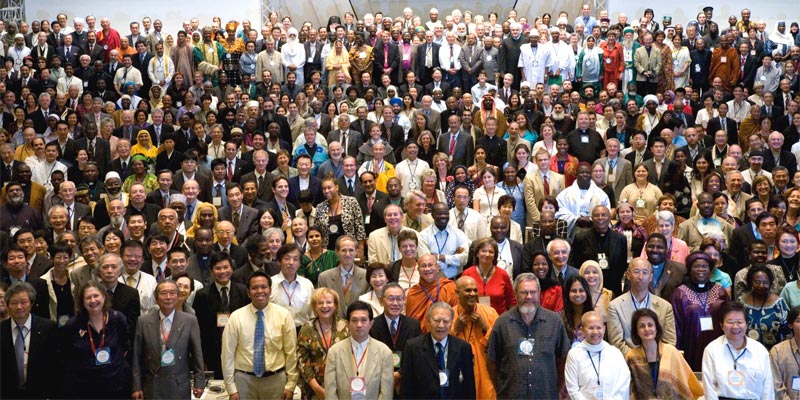

The World Conference of Religions for Peace (WCRP, as it was originally called) convened for the first time in Kyoto, Japan, October 16-21, 1970. However, the origins of Religions for Peace (RFP, as it is called today) date to 1961, when a handful of senior leaders from the world’s major faith traditions began exploring the possibilities for organizing a “religious summit” to address the need for believers around the world to take action toward achieving peace. Principal among the US leaders and architects were Rabbi Maurice Eisendrath (Reform Judaism), Bishop John Wesley Lord (Methodist), Bishop John Wright (Catholic), and Dr. Dana McLean Greeley (UUA).
Fulfilling its mission to engage religious communities on the national and regional levels, Religions for Peace is today organized on several levels: an International Secretariat in New York; Regional Secretariats in Europe, Asia, Latin America and the Caribbean, the Middle East and North Africa; more than 85 affiliates at the national level, and a number of local units. Situated at the United Nations’ headquarters, Religions for Peace enjoys high level general consultative status with the Economic and Social Council (ECOSOC) of the United Nations, and longstanding partnerships with more than a dozen UN agencies, including UNESCO, UNIFEM, and UNICEF.
Mission
Religions for Peace’s mission is to foster common action among the world’s religious communities for peace.
Religions for Peace is the largest international coalition of representatives from the world’s great religions dedicated to promoting peace.
Uniqueness
Representative interreligious councils, religious leaders and religious communities are uniquely positioned to promote the role of religion in advancing disarmament, development, and human rights.
Religious communities are the largest and best-organized civil institutions in the world, claiming the allegiance of billions across race, class, and national divides. These communities have particular cultural understandings, infrastructures, and resources to get help where it is needed most. The work of Religions for Peace is based upon building upon these assets.
Religions for Peace operates with five guiding principles that distinguish its approach:
- Respect religious differences.
- Act on deeply held and widely shared values.
- Preserve the identity of each religious community.
- Honor the different ways religious communities are organized.
- Support locally led multi-religious structures.
Programming
Local, national, and regional affiliates develop programs that are in one or more of three core areas - stopping war, ending poverty, and protecting the earth - according to the particular needs and strengths in a given area. They also focus work on the themes from the World Assemblies of Religions for Peace, such as the current focus on shared security.
Some of Religions for Peace’s recent successes include building a new climate of reconciliation in Iraq; mediating dialogue among warring factions in Sierra Leone and Somalia; organizing an international network of religious women’s organizations; and establishing an extraordinary program to assist the millions of children affected by Africa’s AIDS pandemic, the Hope for African Children Initiative.
Goals for the Future
Religions for Peace is working to assist governments around the globe who wish to develop more thoroughgoing cooperative partnerships with religious communities and interreligious organizations.
Religions for Peace brings together hundreds of key religious leaders every five years to discuss the great issues of our time. In August 2006, the Eighth World Assembly convened in Kyoto. In late 2012, the Ninth World Assembly is being planned for Doha, Qatar.
Contact
Religions for Peace International Secretariat
777 United Nations Plaza
New York, NY 10017
United States of America
212-687-2163
www.religionsforpeace.org
info@religionsforpeace.org
For international affiliates: http://www.religionsforpeace.org/about/contact.html
